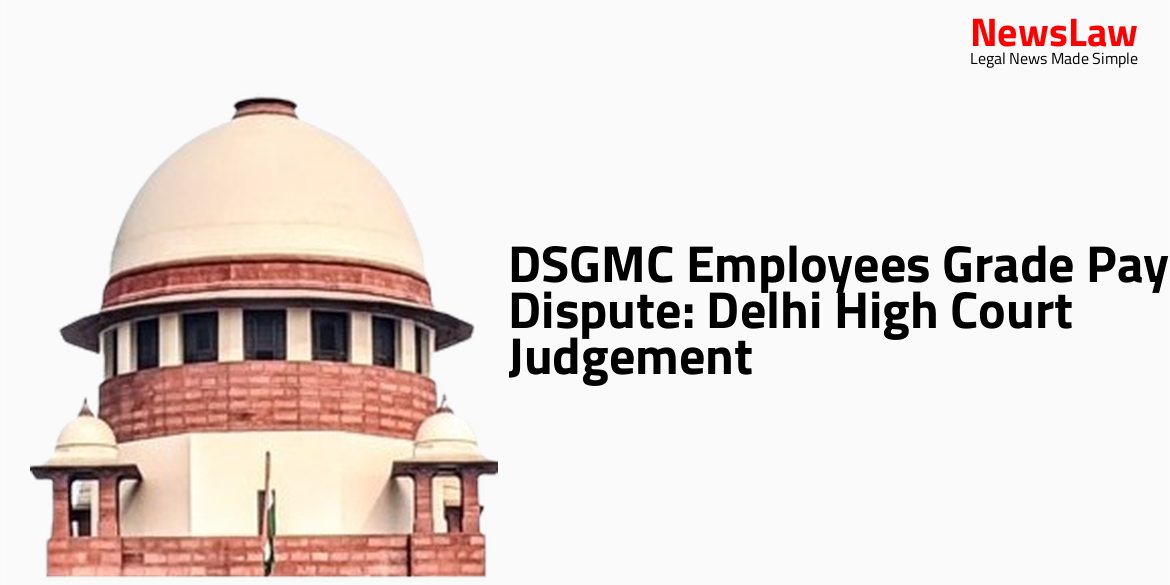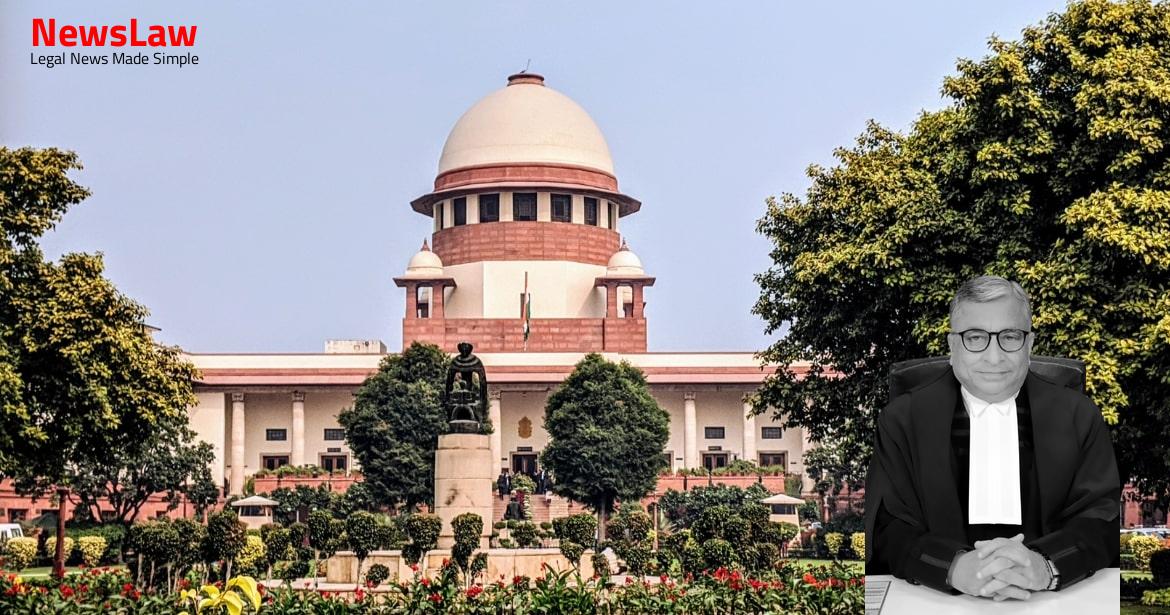In the legal case of Dani Wooltex Corporation v. Sheil Properties, the Supreme Court of India examined the intricacies of the Arbitration Act in relation to allegations of abandonment in arbitral proceedings. The case involved a dispute between Dani Wooltex Corporation as the appellant and Sheil Properties as the respondent. The judgement sheds light on the nuances of arbitration laws and provides insights into the termination of arbitral proceedings. Dive into the details of this significant legal battle!
Facts
- The first appellant, Dani Wooltex Corporation, entered into a Development Agreement with Sheil Properties on 11 August 1993.
- Sheil denied the allegation of abandonment and contested the claims made by the first appellant and Marico.
- The Arbitration Tribunal was dealing with claims filed by both Sheil and Marico against the first appellant.
- The first appellant claimed that Sheil’s inaction for eight years amounted to abandonment of the arbitral proceedings.
- Sheil filed an affidavit arguing against the application of Section 32(2)(c) of the Arbitration Act.
- Marico issued a public notice inviting objections, to which Sheil objected stating transactions would be subject to the Development Agreement.
- The first appellant later filed an application invoking the Arbitral Tribunal’s power under Section 32(2)(c) of the Arbitration Act.
- The dispute between the first appellant and Sheil led to Sheil filing a suit for specific performance of a modified MOU.
- The arbitral proceedings based on Marico’s claim had culminated in an award prior to this suit.
- A consensus was reached between the parties leading to the appointment of a senior Member of the Bar as the sole Arbitrator.
- The first appellant communicated to the Arbitral Tribunal requesting dismissal of Sheil’s claim due to alleged abandonment.
- The Arbitral Tribunal scheduled meetings but Sheil did not attend, leading to a termination order under Section 32(2)(c) of the Arbitration Act.
- Arbitral tribunal passed an order terminating arbitral proceedings under Section 32(2)(c) of the Arbitration Act.
- The decision to terminate proceedings was based on the Calcutta High Court case of NRP Projects Pvt. Ltd. & Anr. v. Hirak Mukhopadhyay & Anr.
- The exercise of power under Section 32(2)(c) suggests that certain conditions justified the termination of the proceedings.
- The termination of arbitral proceedings indicates that the Tribunal found sufficient reasons to exercise its power and bring the proceedings to an end.
- The reliance on a past judicial decision from the Calcutta High Court demonstrates the importance of legal precedent in reaching the decision to terminate the proceedings.
Also Read: State of Himachal Pradesh vs. Accused Vijay: Landmark Judgment by High Court of Himachal Pradesh
Arguments
- The learned senior counsel argued that the Court must assess the legality of the termination of the mandate by the Arbitral Tribunal under Section 14(2) of the Arbitration Act.
- Abandonment cannot be assumed according to the counsel.
- References and suits by Marico and Sheil were separate, leading to separate arbitral proceedings.
- Although there was an overlap regarding consent terms, the parties proceeded with Sheil’s reference after resolving Marico’s reference.
- Counsel relied on the case of Godrej and Boyce Manufacturing Company Limited v. Municipal Corporation of Greater Mumbai & Ors for support.
- The Arbitral Tribunal had tried to ensure Sheil’s involvement in Marico’s arbitration but encountered non-cooperation.
- Sheil’s claim that it was waiting for the decision in the Marico arbitration was questioned as no indication existed that Sheil’s arbitration would proceed only after Marico’s.
- Sheil had shown disinterest in moving the Arbitral Tribunal since 2012, contributing to delays.
- The interpretation of the term ‘unnecessary’ in Section 32(2)(c) of the Arbitration Act was discussed to support the Tribunal’s decision.
- Sheil filed an application challenging the termination of proceedings under Section 14(2) of the Arbitration Act, leading to the High Court directing the Tribunal to continue the proceedings.
- The interference made by the High Court in the arbitral proceedings under Section 14 of the Arbitration Act was deemed justified by the senior counsel.
- Marico’s reference took six years, leading to the postponement of Sheil’s reference.
- After initial directions were given on 8 November 2011 regarding pleadings, no further directions were issued by the sole Arbitrator in Sheil’s reference.
- The senior counsel highlighted that the judgment of the Calcutta High Court in NRP Projects Pvt. Ltd. is specific to the case’s facts.
Analysis
- The inference of abandonment was drawn by the learned Arbitrator based on Sheil’s lack of action in challenging the Marico award and convening a meeting of the Arbitral Tribunal.
- An Arbitrator can withdraw, terminating their mandate, but not the arbitral proceedings as per Sections 14 and 15.
- Clause (c) of sub-section (2) of Section 32 allows the Arbitral Tribunal to terminate proceedings if continuation becomes unnecessary or impossible for any reason.
- Implied abandonment can be inferred from clinching and convincing admitted or proved facts when a claimant’s conduct leads to the only possible conclusion of abandonment.
- Even if implied, convincing circumstances must be present on record to lead to an inevitable inference of abandonment.
- The learned Arbitrator concluded Sheil abandoned its claim without sufficient evidence, leading to an illegal finding.
- Absence in proceedings or failure to participate doesn’t automatically amount to abandonment; abandonment must be established.
- The Arbitral Tribunal must fix hearing dates even if parties don’t request it; duty to adjudicate on the dispute referred.
- Claimant’s failure to appear after filing a claim cannot be reason enough to deem proceedings unnecessary; the Tribunal can proceed as per Section 25.
- An order of abandonment must be based on clear and convincing evidence; abandonment cannot be readily inferred.
- Parties’ conduct and actions can indicate priority given to specific claims without implying abandonment.
- Sheil’s failure to challenge Marico’s award didn’t amount to abandonment of its own claim; separate claims were filed by Sheil and Marico.
- Merely not moving for a hearing date after filing a claim doesn’t signify abandonment; abandonment must be proven.
- The application raised by the first appellant alleging abandonment lacked sufficient evidence to support the claim.
- Abandonment must be explicitly established and not casually assumed to prevent defeating the objectives of the Arbitration Act.
- If parties do not agree on timelines for filing statements of claim and defence, the Arbitral Tribunal has the power to determine the timelines for filing pleadings.
- The arbitral proceedings can be terminated if the claimant withdraws his claim, parties agree on termination, or if the proceedings are deemed unnecessary or impossible by the arbitral tribunal.
- The mandate of the arbitral tribunal ends with the termination of the arbitral proceedings.
- The Arbitration Act allows termination of arbitral proceedings on the claimant’s default to file a statement of claim.
- Sections 14 and 15 of the Arbitration Act provide for terminating an Arbitrator’s mandate.
- The appointment of the Arbitral Tribunal is made to adjudicate on disputes covered by the arbitration clause.
- An Arbitrator is professionally appointed and has a duty to adjudicate on the dispute and make an award.
- Parties must file pleadings within six months of the Arbitrator’s or Arbitral Tribunal’s appointment.
- Parties should be given advance notice of any hearing or meeting of the Arbitral Tribunal.
- Section 25 of the Arbitration Act addresses parties’ defaults and consequences like termination of proceedings.
- Failure to communicate statements of claim or defence can lead to termination or continuation of arbitral proceedings.
- Arbitral Tribunal can continue proceedings and make an award based on available evidence if a party fails to appear at an oral hearing or produce documents.
- Failure of a claimant to move the Arbitral Tribunal to fix a date for the hearing after filing statement of claim does not amount to abandonment of the claim.
- Concurrence with the view taken by the learned Single Judge on this issue.
Also Read: Karnataka Biotics vs. The Board for Industrial Finance and Reconstruction
Decision
- The learned sole Arbitrator has withdrawn from the proceedings.
- Parties to appoint a substituted Arbitrator in accordance with the law.
- Arbitral Tribunal to continue the proceedings.
- The appeal is dismissed with no order as to costs.
Case Title: DANI WOOLTEX CORPORATION Vs. SHEIL PROPERTIES PRIVATE LIMITED (2024 INSC 433)
Case Number: C.A. No.-006462-006462 – 2024



